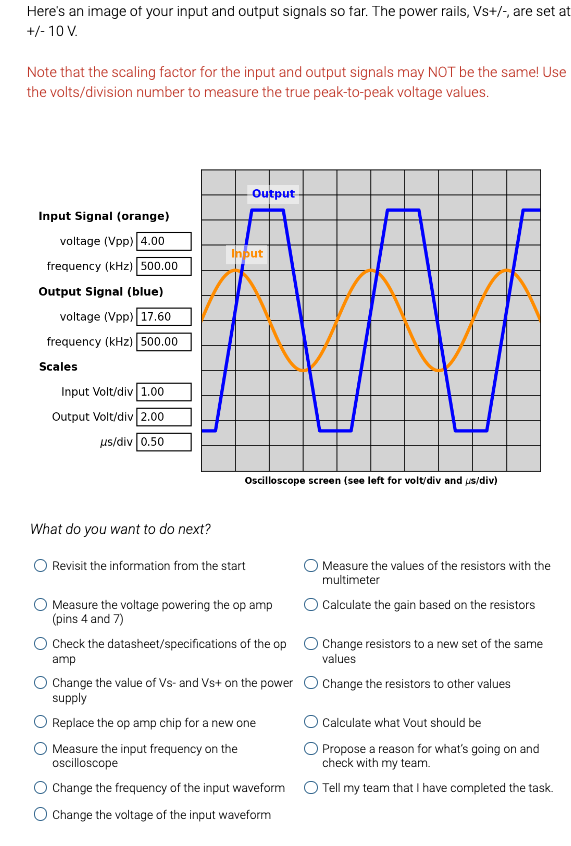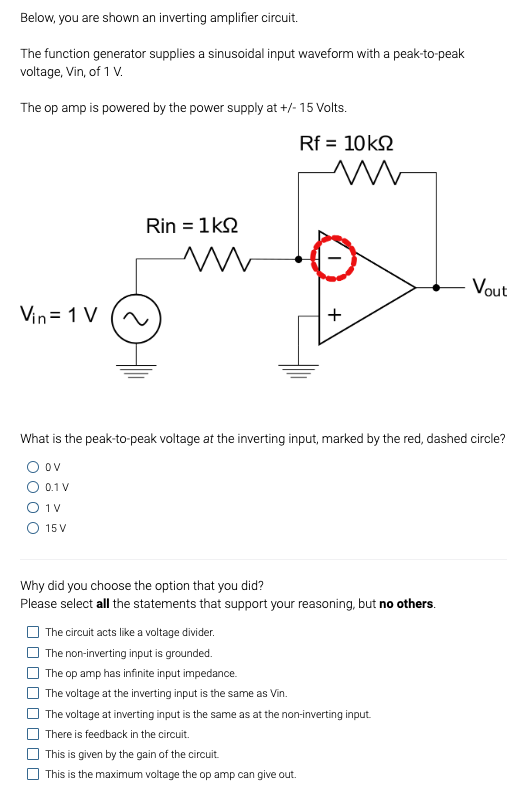Developed by Benjamin Pollard, Michael F. J. Fox, Laura Rios, Dimitri R. Dounas-Frazer, Alexandra Werth, Heather Lewandowski
| Purpose | To measure students' processes of modeling in advanced lab classes focusing on either electronics or optics. |
|---|---|
| Format | Pre/post, Multiple-choice, Multiple-response |
| Duration | N/A min |
| Focus | Lab skills (modeling, Electronics, Optics) |
| Level | Upper-level |
Part 1 for the Electronics Assessment:
Part 2 (Coupled Multiple Response) example from Electronics Assessment
Additional information about MAPLE can be found on the development website.
if you are interested in using MAPLE for your course, please complete the course information survey.
more details
This is the second highest level of research validation, corresponding to at least 5 of the validation categories below.
Research Validation Summary
Based on Research Into:
- Student thinking
Studied Using:
- Student interviews
- Expert review
- Appropriate statistical analysis
Research Conducted:
- At multiple institutions
- By multiple research groups
- Peer-reviewed publication
MAPLE was developed in three steps. The first step, beginning Fall 2017, was to interview instructors in upper division Electronics and Optics labs. Step Two was think-aloud problem solving interviews with students. The third step was iterating on the instructor and student interviews to develop the final survey.
References
- D. R. Dounas-Frazer and H. Lewandowski, Electronics lab instructors’ approaches to troubleshooting instruction, Phys. Rev. Phys. Educ. Res. 13 (1) 010102 (2017).
- D. Dounas-Frazer, J. Stanley, and H. Lewandowski, Instructor perspectives on iteration during upper-division optics lab activities, presented at the Physics Education Research Conference 2017, Cincinnati, OH, 2017.
- M. Fox, B. Pollard, L. Ríos, and H. Lewandowski, Capturing modeling pathways using the Modeling Assessment for Physics Laboratory Experiments, presented at the Physics Education Research Conference 2020, Virtual Conference, 2020.
- B. Pollard, M. Fox, L. Ríos, and H. Lewandowski, Creating a coupled multiple response assessment for modeling in lab courses, presented at the Physics Education Research Conference 2020, Virtual Conference, 2020.
- B. Pollard, R. Hobbs, D. Dounas-Frazer, and H. Lewandowski, Methodological development of a new coding scheme for an established assessment on measurement uncertainty in laboratory courses, presented at the Physics Education Research Conference 2019, Provo, UT, 2019.
- L. Rios, B. Pollard, D. Dounas-Frazer, and H. Lewandowski, Using think-aloud interviews to characterize model-based reasoning in electronics for a laboratory course assessment, Phys. Rev. Phys. Educ. Res. 15 (1), 010140 (2019).
- L. Ríos, B. Pollard, D. Dounas-Frazer, and H. Lewandowski, Pathways to proposing causes for unexpected experimental results, presented at the Physics Education Research Conference 2018, Washington, DC, 2018.
We don't have any translations of this assessment yet.
If you know of a translation that we don't have yet, or if you would like to translate this assessment, please contact us!
| Typical Results |
|---|
Example of Part 2 scoring from the Electronics assessment. The answer score is the score of the multiple choice question and the reasoning score is the score of the multiple response question. |
The latest version of the MAPLE, released in 2020, is version 1. Instructor interviews, think-aloud problem solving interviews, and survey revisions were conducted between 2017 and 2020.




